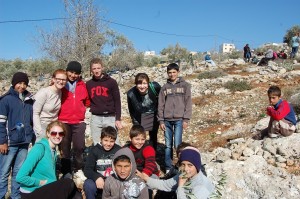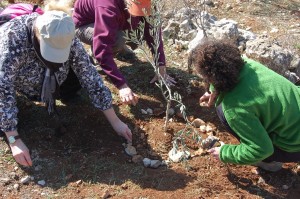Musings from Students of the Pardes Institute of Jewish Studies in Jerusalem
Posted on January 17, 2014 by Sarah Pollack
From my blog:
| Deuteronomy 20: 19. When you besiege a city for many days to wage war against it to capture it, you shall not destroy its trees by wielding an ax against them, for you may eat from them, but you shall not cut them down. Is the tree of the field a man, to go into the siege before you? | כִּי תָצוּר אֶל עִיר יָמִים רַבִּים לְהִלָּחֵם עָלֶיהָ לְתָפְשָׂהּ לֹא תַשְׁחִית אֶת עֵצָהּ לִנְדֹּחַ עָלָיו גַּרְזֶן כִּי מִמֶּנּוּ תֹאכֵל וְאֹתוֹ לֹא תִכְרֹת כִּי הָאָדָם עֵץ הַשָּׂדֶה לָבֹא מִפָּנֶיךָ בַּמָּצוֹר: |
 I recently realized that living a life worth blogging about and also blogging is very difficult. Writers with interesting lives must constantly be stressed. So, instead of doing extensive research, adding a lot of links, and spending two days writing a post, I wanted to try and blog about something that I did today before time gets the best of me.
I recently realized that living a life worth blogging about and also blogging is very difficult. Writers with interesting lives must constantly be stressed. So, instead of doing extensive research, adding a lot of links, and spending two days writing a post, I wanted to try and blog about something that I did today before time gets the best of me.
I groggily started the day in Jerusalem, walking to a nearby park to meet a group of people traveling to the Palestinian village of Jalud to plant trees in honor of Tu B’Shvat. Rabbis for Human Rights, a rabbinic voice for justice in Israel, organized the trip after they heard about a tragedy that happened in the village. A few weeks ago, in the middle of olive harvest season, settlers from nearby villages came into Jalud and burned down almost an entire orchard of trees. Jalud is surrounded by Esh Kodesh, Adi Ad, Ahiya and Shvut Rachel – all settlements.
 We traveled for about an hour, down windy roads, passed villages, settlements, soldiers and horses, until we arrived in Jalud. The residents told us about their reliance on agriculture and how difficult it has been. Their trees have been poisoned, cut down and burned – making it impossible to harvest. Jewish tradition speaks at length about the relationship between man and tree and the very many similarities between the two. ”Man is a tree of the field” (Deuteronomy 20:19) However, you don’t need to look in the Torah to see that humans, like trees, have roots, have a support system and a foundation that we stem from. You don’t need to be a wise sage to know, that like trees, we grow fruit, have children, and spread our seed. Burning down a tree can be equated to ending a life, chopping down a person, preventing them from bearing fruit.
We traveled for about an hour, down windy roads, passed villages, settlements, soldiers and horses, until we arrived in Jalud. The residents told us about their reliance on agriculture and how difficult it has been. Their trees have been poisoned, cut down and burned – making it impossible to harvest. Jewish tradition speaks at length about the relationship between man and tree and the very many similarities between the two. ”Man is a tree of the field” (Deuteronomy 20:19) However, you don’t need to look in the Torah to see that humans, like trees, have roots, have a support system and a foundation that we stem from. You don’t need to be a wise sage to know, that like trees, we grow fruit, have children, and spread our seed. Burning down a tree can be equated to ending a life, chopping down a person, preventing them from bearing fruit.
 People traveled from Jerusalem and Tel Aviv in vans, cars and busses, to replace the trees that had been lost. Men and children from Jalud came to help us plant, show us where to place the trees, and spend time with us. We laughed and conversed, without verbal communication. Exchanged high fives, thumbs up and peace signs. Spread smiles. Jews, wearing kippot, tzitzit flying in the wind, were planting trees in a Palestinian village. Wow.
People traveled from Jerusalem and Tel Aviv in vans, cars and busses, to replace the trees that had been lost. Men and children from Jalud came to help us plant, show us where to place the trees, and spend time with us. We laughed and conversed, without verbal communication. Exchanged high fives, thumbs up and peace signs. Spread smiles. Jews, wearing kippot, tzitzit flying in the wind, were planting trees in a Palestinian village. Wow.
From there, we went to a few locations that were a little more difficult to see. In Jalud, people were happy to see us. Although they spoke about hardships and the difficulties of farming there, they didn’t see very angry, they didn’t seem upset. In fact, almost every person that I talked to, through broken English said “thank you.” Almost everyone said, “You are welcome here.” Everyone greeted me with a smile. They knew that we were Jews, knew that we were Israelis, and wanted to spend time with us. They brought us snacks, shared drinks, and tried to Facebook friend every girl that they saw.
On January 7, a group of male settlers from the settlement of Esh Kodesh were found walking through an olive field in the Palestinian village of Qasra, not far from Jalud. Obviously, there are many versions of the story and I encourage you to research the events and read multiple news sources. The settlers had not done anything on this particular day, but were trespassing on Palestinian land. However, there have been many attacks, similar to those in Jalud, on the olive trees and residents of Qasra in the recent past. Palestinians proceeded to beat the settlers very badly. I don’t want to post graphic images of their injuries, but they’re easily accessible if you google the event. At some point, elders in the community who do work with Rabbis for Human Rights, saw what was happening, and took the settlers into their home to protect them. The elders called the Israeli Defense Force, the army, and requested that they come to pick up the settlers and bring medical care. The settlers were handed over to the IDF and four were arrested and three were sent to the hospital.
A week later, on January 15th, a mosque in Dayr Istiya, a Palestinian Village, was set on fire. On the outer wall of the mosque, the words “Blood revenge for Your servants in Qasra” and “Arabs out” were spray painted in Hebrew. The door to the mosque as well as parts of the rug inside were burned. The attack is suspected to be a revenge for the attack of the settlers in Qasra by a group known Price Tag. The goal of the group, according to the New York Times, is to ”exact a price from local Palestinians or from the Israeli security forces for any action taken against their settlement enterprise.” Wikipedia has compiled a list of their attacks since 2008.
I debated posting about these aspects of the trip. I could have simply said that we went and planted trees and posted pictures of all of the adorable children that we saw – including, but not limited to, the most adorable one who picked flowers and gave them to us. I could have just posted the smiling photos of us, posing with our olive tree, saying, “Happy Tu B’shvat.” I could have done that and left out the part where Jews did something terrible, the part where Jews made a terrible name for us all across the world. Ynet posted, “The US government has condemned the torching of a mosque door near Ariel, and demanded that the Israeli administration investigates the event and indicts those involved. The State Department noted that any attack on a religious ground is an attack against all religions.”
There are two concepts in Judaism, kiddush Hashem and hilul Hashem. The first, kiddush, comes from the root kuf, dalet, shin, which means holy, like kadosh. The phrase means “to sanctify G-’s name.” This means doing acts of love and kindness to non-Jews, helping a stranger, doing anything to show holiness. Hillul comes from the root het, lamed, lamed, which usually means empty.
Hallal means space, halil means flute, which is a hollow tube, etc. The phrase means “to desecrate G-d’s name.” Jews burning a mosque and detracting from it’s sanctity by spray painting on it is a desecration of G-d’s name.
My eyes welled up with tears when we stood at the doorstep of the mosque. I imagined myself, back at home in Florida, arriving for Friday night services at Kol Tikvah, our synagogue, only to find that it had been burned and spray painted on. There’s nothing in Judaism that supports vandalism and the destruction of a holy place, nothing in modern Judaism to support revenge attacks.
Here were two places, desecrated by flames. Rabbi Arik Ascherman from Rabbis for Human Rights said, as we gathered at the mosque, “Today, we are here to be fire fighters.” The fire already consumed what it came to consume, we couldn’t put it out, we couldn’t reverse the damage. However, as I stood there, looking up at the mosque, wondering if any other Jews had come to empathize with these Muslims, I felt like standing in solidarity made a little bit of a difference.